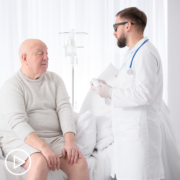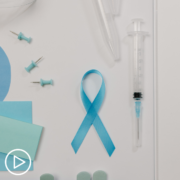What Are Current Prostate Cancer Treatment Options?
What Are Current Prostate Cancer Treatment Options? from Patient Empowerment Network on Vimeo.
What treatment options are available for prostate cancer patients? Expert Dr. Channing Paller shares an overview of prostate cancer treatment options including surgery, radiation, combination therapies, hormonal therapies, and the PEACE-1 clinical trial.
Dr. Channing Paller is Director of Prostate Cancer Clinical Research at Johns Hopkins Medicine. Learn more about Dr. Paller.
See More From INSIST! Prostate Cancer
Related Resources

|

What Key Factors Impact Prostate Cancer Treatment Decisions? |

Advanced Prostate Cancer: How to Access the Best Care and Treatment for YOU |
Transcript:
Katherine:
What are other options that are available now, for patients?
Dr. Paller:
For curative intent, the main two treatment options are surgery, radiation. Many people for very localized disease are trying other therapies, such as cryotherapy, and more focal therapies. But really, for curative, the standard is surgery or radiation. And as it gets more advanced, circling back to advanced prostate cancer, we are learning that combination therapy is better. So, adding pills like abiraterone, adding systemic therapies, help patients do better.
So, there’s a big, long list of therapies upfront that we use for metastatic hormone-sensitive prostate cancer. There’s abiraterone, there is apalutamide (Erleada), there’s enzalutamide, and now, darolutamide (Nubeqa).
And in fact, in fit patients that can tolerate chemotherapy for metastatic high-volume prostate cancer patients, we always recommend triple therapy, either with abiraterone, docetaxel, and ADT, or with darolutamide, docetaxel, and ADT, and these patients really seem to do better for longer. The other thing I would add is the PEACE-1 trial, which looked at abiraterone and docetaxel, found that patients would do best by adding growth factor support. And so, that is recommended.
The other thing I want to point out to patients is, I know we’re all eager to get started when we find out we have a diagnosis of metastatic prostate cancer, but sometimes, these therapies are quite tough on the system when you have a lot of cancer in your body, and my recommendation to everybody is, one thing at a time.
So, start the hormone therapy and wait at least 30 days, and in fact, in the PEACE-1 trial, they waited 45 days, right? That allows the testosterone levels to fall, it allows you to adjust to the side effects of hormone deprivation therapy, and it allows your body to be ready for the next line of therapy. And you can add the ADT to second line, such as abiraterone or daro during that time, but not adding the chemo all at once, that really makes a difference.
I find, unfortunately, when patients and their providers don’t follow those strict criteria, as they did in the trial, meaning they start chemo and abiraterone and ADT on day one, the levels of chemotherapy get higher in the bloodstream because testosterone regulates that, and we’ve published on that before. And they end up with terrible side effects from the chemotherapy, such as neutropenic fever, which means you end up in the hospital with a bloodstream infection and a fever, and more neuropathy, meaning numbness and tingling in your hands and feet.
And so, I really caution people to spread those therapies out over the first 90 days, and you’ll do better in terms of side effects, and just as well in terms of overall survival.
Katherine:
Where does hormonal therapy fit into the treatment options, and have there been any advances in hormonal therapy?
Dr. Paller:
Yes. So, hormonal therapy is the mainstay of how we take care of prostate cancer patients, whether we do this with surgical castration, which is not done very often anymore, or we do it with an LHRH agonist, or we do it with an LHRH antagonist. So, that means that we can do it with medicines that block the signaling, but that tells your body to produce testosterone in various ways. What’s really neat is we’ve made advances, that there are now oral options for some of these therapies.
In particular, there’s a new therapy called Orgovyx, or relugolix, that is an oral LHRH antagonist that locks testosterone and allows us to stop prostate cancer growth. In addition, there are a variety of LHRH agonists that can be given as subcutaneous shots.



